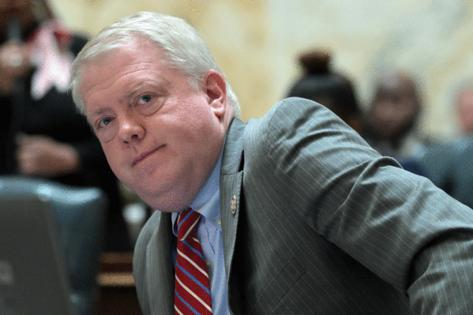What do Maryland Republicans want in the budget? 1 showed us
Published in News & Features
BALTIMORE — As the clock ticks closer to the last day of session, Republican lawmakers have raised concerns about the budget Maryland Democrats are rushing to get in shape to head to Gov. Wes Moore’s desk.
“There are major policy bills coming to the floor in the next few days that are still fraught with unanswered questions,” Senate Minority Leader Steve Hershey, an Eastern Shore Republican, said in a statement Friday.
He said Democratic leadership is “coming up short” on details that will “make or break” state residents and business owners.
Republicans have started sharing some details of their own.
During a tense debate last week, House Majority Leader Jason Buckel, an Allegany County Republican, offered an amendment to the budget bill that would provide “roughly” $1.6 billion in additional cuts, eliminating the need for new and increased taxes.
The Democratic supermajority swiftly rejected it.
Shut out of meaningful conversations
In the amendment, Buckel was seeking to slash over $267 million in Medicaid services appropriated to cover emergency medical services for people who entered the country illegally, dental services for low-income Marylanders, long-term services and health care support, home and community-based services for disabled Marylanders and gender-affirming care.
It also attempted to save $10 million by lowering the income eligibility requirement for the Maryland Children’s Health Program from 322% above the federal poverty level to 275%.
In the education realm, Buckel’s amendment attempted to freeze increases in funding through the Blueprint for Maryland’s Future education reform program to shave $483.5 million from the proposed budget. The freeze would have applied to the state share of the foundation program, compensatory education, full-day prekindergarten, teacher development, education effort adjustments, community school grants, students with disabilities, English language learners and grants for children most at risk of not succeeding academically.
It also would have cut $36.7 million in aid to nonpublic colleges and universities.
Buckel’s amendment would have implemented a hiring freeze for state government agencies, except those that provide direct care and guardianship to people in the state’s custody, eliminated 42 vacant and new positions, and denied the 1% cost-of-living adjustment that government employees negotiated with the state. This would have reduced the budget by $277.8 million in general funds, $49.1 million in special funds and $40.5 million in funding from the federal government.
Finally, Buckel’s amendment would have cut $50 million for local government clean energy projects, pending the passage of legislation, and transferred $100 million from the Strategic Energy Investment Fund to the state’s General Fund.
Asked if he had approached the House Appropriations Committee with his ideas before the budget debate, Buckel said they “never would have been considered.”
“I think I’m pretty good friends with the leader of the Appropriations Committee — I respect him — but he was never going to consider that honestly,” he said. “I think what you heard a lot of during the debate is Republicans saying we’re shut out of these meaningful conversations.”
Buckel didn’t mean literally shut out, noting that they are present at the public hearings, but said that major fiscal decisions are made by Democratic leadership and their staff “in back rooms and private meetings that we’re not invited to.”
“The die was already cast, and that room over there is the opportunity that we have for all of Maryland to bring these issues to the forefront and for people to vote,” Buckel said, pointing toward the House chamber in the State House.
“You don’t think our amendment made sense? Go ahead and vote against it, but don’t say, ‘Well, gee, if you just would have told us two weeks earlier in the committee, we probably would have done it.’ That’s not true.”
How Democrats are closing the deficit
The Maryland General Assembly is constitutionally required to pass a balanced budget before it can adjourn for the year on April 7.
In January, Moore, a Democrat, introduced a budget with $2 billion in cuts. House Democrats slashed nearly $500 million more.
But, in order to balance the budget, Democratic leadership is proposing a series of new and increased taxes, including a 3% tax on data and IT services, like cloud storage and website platforms, as well as a .8% increase on the state’s vehicle excise tax.
Republicans have railed against the taxes, with some going as far as to publicly tell businesses not to move to Maryland.
Hershey said it’s “hypocritical and disingenuous” for Maryland Democrats to criticize President Donald Trump for implementing a 25% tariff on foreign vehicles and car parts because they are attempting to put increased taxes and fees on car ownership for their constituents.
Maryland’s proposed budget includes a higher excise tax, increased registration fees, a gas tax and a $5 per-tire tax on top of a $1 tire recycling tax, he said.
“There is no one making vehicle ownership more expensive than Maryland Democrats,” Hershey said.
Senate President Bill Ferguson, a Baltimore Democrat, said Friday that he would “love” for his colleagues in the minority party to point to Trump’s 25% tax on foreign cars.
“It does seem very quiet,” he said. “What’s good for the goose is good for the gander.”
In regard to Maryland’s fiscal situation, nothing is set in stone. The House passed the budget and its companion bill Wednesday, and the Senate is set to present amendments to both during a debate next week.
--------------
©2025 The Baltimore Sun. Visit at baltimoresun.com. Distributed by Tribune Content Agency, LLC.







Comments